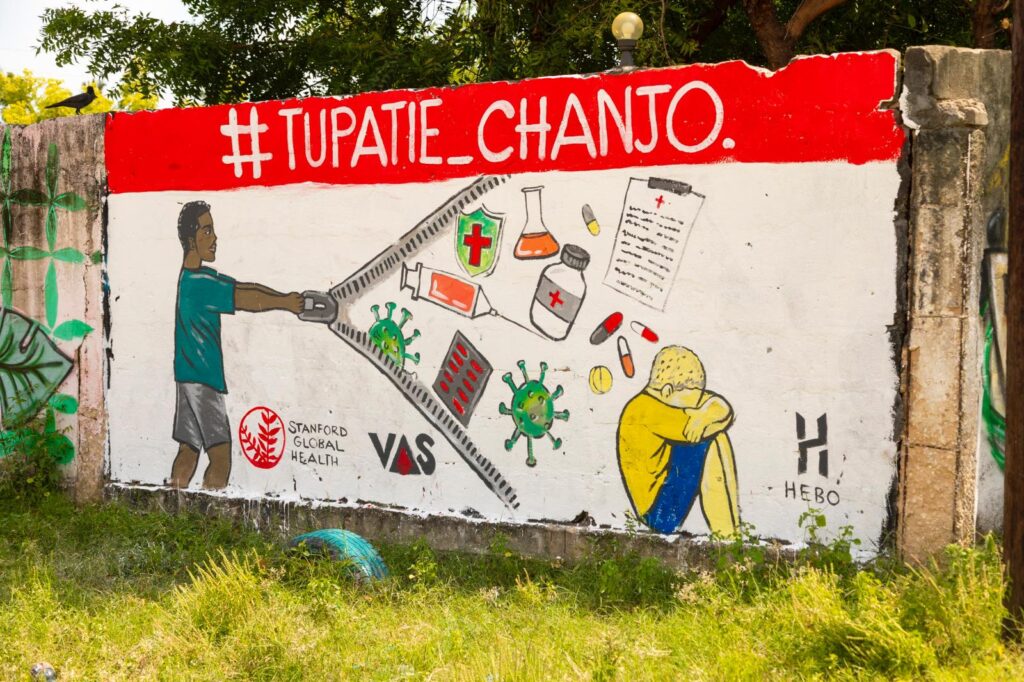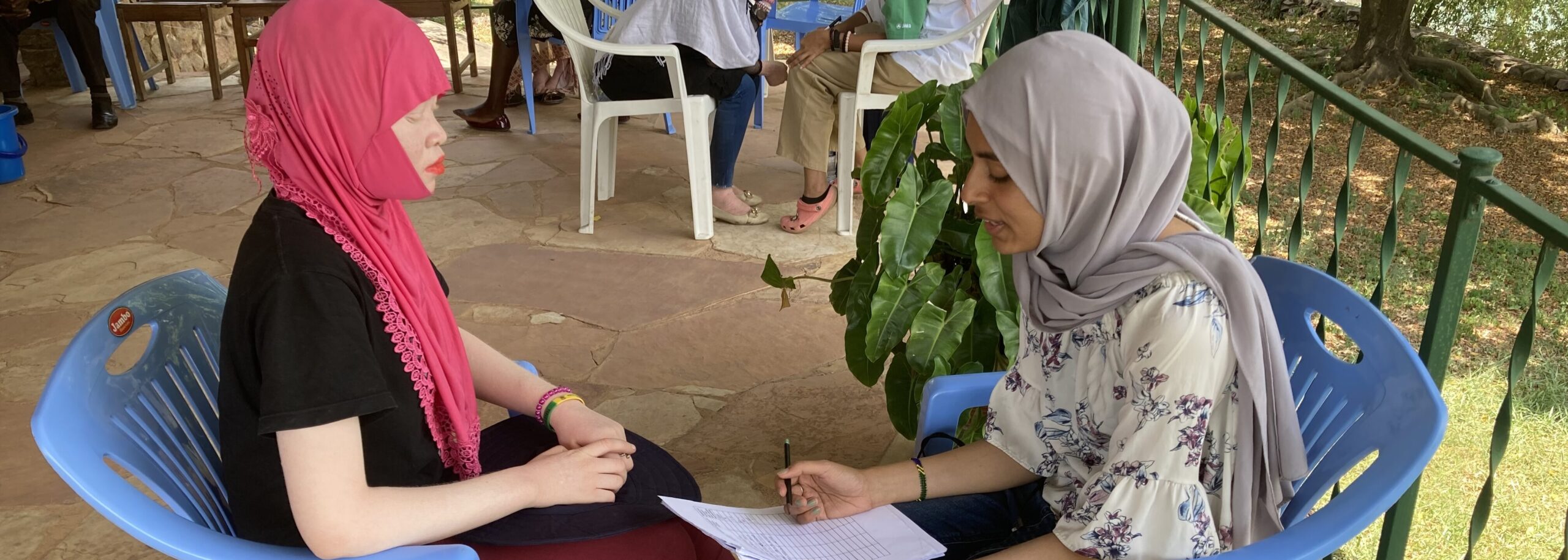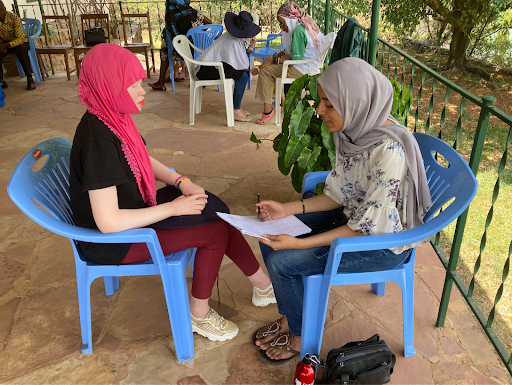Published: 04/26/2024
In Tanzania, people with albinism face historic discrimination and barriers to healthcare. A global health seed grant-funded project is working with the community to change that.
By Jamie Hansen, Global Health Communications Manager
When a crisis like a pandemic strikes, nearly everyone feels its impact — but not equally. Global health challenges can widen gaps in healthcare access and deepen injustices for communities already on the margin.
A new research project funded by a Stanford Global Health Seed Grant has been working to understand and address the impacts of the pandemic on one particularly vulnerable group: people with albinism in Tanzania.
Misunderstandings and stigma create health barriers
Albinism, a genetic disorder that results in a lack of melanin in the body, is linked to an increased risk of skin cancer and poor vision. Tanzania has one of the highest rates of albinism in the world, and historic myths and misunderstandings about the condition have led to this community facing stigma, segregation, physical attacks, and even murder.
Because of this discrimination, people with albinism often live in poverty and face barriers to health care that make them particularly susceptible to infectious disease outbreaks.
Pandemic deepens inequities, and a research question evolves
As the pandemic unfolded, Zahra Fazal, a master’s student in epidemiology and clinical research at Stanford Medicine, suspected that these factors would lead people with albinism to be vaccinated at much lower rates than the general population in Tanzania. She’d been working with the albinism community and volunteering with related nonprofits for more than a decade, after first becoming aware of the discrimination they faced through a novel she read as a grade school student in Tanzania.
Alongside her mentor Dr. Steve Luby, Stanford Medicine’s Associate Dean of Global Health Research, she successfully applied for a 2023 Global Health Seed Grant. The grant, funded by the Stanford Department of Medicine and Stanford Center for Innovation in Global Health, supported a community-engaged study — the first of its kind — to understand vaccination uptake, barriers, and attitudes among people with albinism in Tanzania.
“Zahra has leveraged resources and opportunities at Stanford to catalyze a magnificent ripple effect,” said Joelle Rosser, MD, an assistant professor in the Division of Infectious Disease and Geographic Medicine and a co-investigator on the project. “She not only designed and implemented a research project to shed light on an important health disparities issue, but she has also used this research platform to get dozens of young people in Tanzania involved in research for the first time.”
“The data we collect is more than a number, it is someone’s neighborhood.”
Fazal says her interest in global health and epidemiology was shaped by growing up in a small town in Tanzania. Having a parent with a disability allowed her to witness, first-hand, the barriers in accessing high-quality medical care, including high of out-of-pocket costs and a lack of publicly available data to guide their health decisions.
She realized that a lack of synergy between medical care and the social determinants of health, such as socioeconomic status, housing and food insecurity, resulted in preventable reinfections. She saw, for instance, that unaddressed food insecurity could lead to malnutrition. Malnutrition, in turn, compromised the immune system and made people more susceptible to infectious diseases — and re-infections in particular. This understanding of the ways in which disabilities and other disadvantages impact access to dignified healthcare later informed her work with people with albinism, who are often classified as having disabilities.
So as she crafted her research project, she strove to ensure that the effort benefitted and included the community.
“I think it’s an important obligation we have, being at Stanford and working in global health, to recognize that the data we collect is more than a number,” she said. “It has meaning; it is someone’s neighborhood.”
As Fazal assembled her study team, she included local Tanzanian high school students in order to offer them exposure to research and career opportunities. She also involved local albinism rights organizations, including Standing Voice, Tanzania Albinism Society and the Ukerewe Albinism Society. They also collaborated with Tanzanian universities: Muhimbili University of Allied and Health Sciences and Kilimanjaro Christian Medical University College.
“It was important to ensure that these communities who have been historically denied data about themselves were not just part of the conversation, but able to lead it,” she said.
Fazal’s mentor, Dr. Steve Luby, celebrated Fazal’s approach. “The core value of public health is social justice,” he said. “Zahra’s outstanding community engagement and rigorous scientific work is a step towards a more just world.”
Zahra’s outstanding community engagement and rigorous scientific work is a step towards a more just world.
Steve Luby, MD, Associate Dean of Global Health Research
Study reveals key barriers to vaccination for people with albinism
In the summer of 2023, the team surveyed and interviewed 232 people — half with albinism and the other half their neighbors without— in two areas of Tanzania. They sought to understand their attitudes about vaccines and the obstacles they faced to receiving them. They found that people with albinism were significantly less likely to be vaccinated for COVID-19 compared with their neighbors without albinism. Only 14 percent of people with albinism received the vaccine, compared with 27 percent without albinism. This was despite close to half of people with albinism expressing vaccine acceptance.
Interviews with the community revealed key barriers, including long wait times that led to dangerous sun exposure, fear of vaccine side effects, concerns about mistreatment by medical providers, and difficulties accessing vaccine information in the media.
But the project didn’t end there. Researchers also worked with the community to find meaningful ways to use the study results to advance the priorities of people with albinism.
“Through the study, we realized that the community’s priority was actually normalizing albinism,” Fazal said. “And that was important because vaccination hesitancy came from structural barriers related to stigma and misunderstanding, rather than misinformation.”
“Through the study, we realized that the community’s priority was actually normalizing albinism,” Fazal said. “And that was important because vaccination hesitancy came from structural barriers related to stigma and misunderstanding, rather than misinformation.”
Zahra Fazal, Stanford Graduate Student, Epidemiology
Overcoming stigma and misunderstanding
They used a range of artistic platforms and communication methods to help normalize albinism, including organizing radio interviews and creating a rap song that spoke about albinism. The song was designed based on themes the participants requested in the survey and combines English, Swahili and a tribal language to reach its target audiences in Tanzania.
“Now don’t be afraid to hold my hand. We are one family, a clan…I’m walking with freedom on my land,” the artist sings.
They also created a mural in Dar es Salaam depicting the challenges faced by individuals with albinism in accessing health service. They hope the mural will help spark conversations and encourage those without albinism to help reduce barriers to health care for this community.

The research team is also sharing their findings with the office of the United Nations expert on albinism and other international partners to find ways in which interventions can support vaccination efforts for the community.
Rosser credited Fazal with returning to her guiding principle of carefully considering the local community’s input and values at every major decision point. “Her engagement across academic and non-academic partnerships has resulted in tangible investment from outside groups in improving vaccine access to people living with albinism,” Rosser said.
“We hope our findings will inform future policy around the prioritization of people with albinism in healthcare,” Fazal said.
Acknowledgements:
Stanford’s Center for African Studies and the Markaz Resource Center also funded this project. Fazal’s studies at Stanford are supported by the Knight Hennessey program.
Co-investigators included Joelle Rosser, MD, MS, Infectious Disease; Florida Muro, MD, PhD, Kilimanjaro Christian Medical University College; David Rehkopf, Sc.D, MPH, Epidemiology and Population Health; Karim Manji, MD, M.Med, MPH, Muhimbili University of Health and Allied Sciences.

